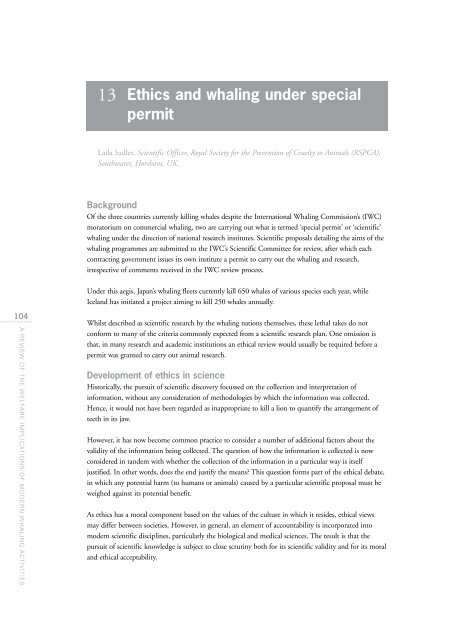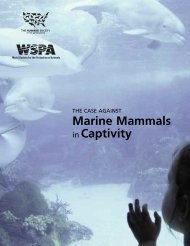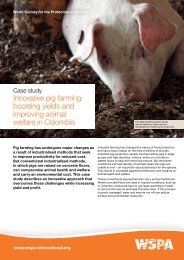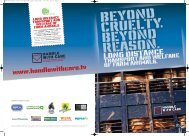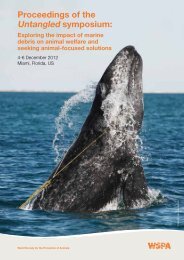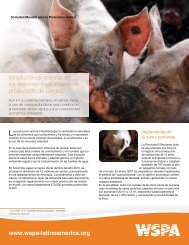TROUBLED WATERS - Whale and Dolphin Conservation Society
TROUBLED WATERS - Whale and Dolphin Conservation Society
TROUBLED WATERS - Whale and Dolphin Conservation Society
- No tags were found...
You also want an ePaper? Increase the reach of your titles
YUMPU automatically turns print PDFs into web optimized ePapers that Google loves.
13 Ethics <strong>and</strong> whaling under specialpermitLaila Sadler, Scientific Officer, Royal <strong>Society</strong> for the Prevention of Cruelty to Animals (RSPCA),Southwater, Horsham, UK.BackgroundOf the three countries currently killing whales despite the International Whaling Commission’s (IWC)moratorium on commercial whaling, two are carrying out what is termed ‘special permit’ or ‘scientific’whaling under the direction of national research institutes. Scientific proposals detailing the aims of thewhaling programmes are submitted to the IWC’s Scientific Committee for review, after which eachcontracting government issues its own institute a permit to carry out the whaling <strong>and</strong> research,irrespective of comments received in the IWC review process.Under this aegis, Japan’s whaling fleets currently kill 650 whales of various species each year, whileIcel<strong>and</strong> has initiated a project aiming to kill 250 whales annually.104A REVIEW OF THE WELFARE IMPLICATIONS OF MODERN WHALING ACTIVITIESWhilst described as scientific research by the whaling nations themselves, these lethal takes do notconform to many of the criteria commonly expected from a scientific research plan. One omission isthat, in many research <strong>and</strong> academic institutions an ethical review would usually be required before apermit was granted to carry out animal research.Development of ethics in scienceHistorically, the pursuit of scientific discovery focussed on the collection <strong>and</strong> interpretation ofinformation, without any consideration of methodologies by which the information was collected.Hence, it would not have been regarded as inappropriate to kill a lion to quantify the arrangement ofteeth in its jaw.However, it has now become common practice to consider a number of additional factors about thevalidity of the information being collected. The question of how the information is collected is nowconsidered in t<strong>and</strong>em with whether the collection of the information in a particular way is itselfjustified. In other words, does the end justify the means? This question forms part of the ethical debate,in which any potential harm (to humans or animals) caused by a particular scientific proposal must beweighed against its potential benefit.As ethics has a moral component based on the values of the culture in which it resides, ethical viewsmay differ between societies. However, in general, an element of accountability is incorporated intomodern scientific disciplines, particularly the biological <strong>and</strong> medical sciences. The result is that thepursuit of scientific knowledge is subject to close scrutiny both for its scientific validity <strong>and</strong> for its moral<strong>and</strong> ethical acceptability.


